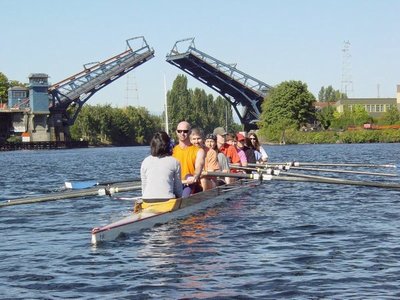June 5, 2008
Teaching Scholars Program prepares education leaders
Rowing shells feel tippy, as if any movement might capsize them, until rowers get used to them. They’re a curious first meeting place for each new cohort of Teaching Scholars.
As a new group tries to launch the shells and keep from falling into Lake Union, there’s always some anxiety but also a sense of camaraderie.
Lynne Robins, Teaching Scholars Program director and a longtime rower, said, “Each group learns quickly that every person has a vital role. I want new group members to reflect on what they bring to the group and to understand how valuable each individual is.” Plus, she added, it’s a lot of fun. Just like the Teaching Scholars Program.
The program began in 1995 to bring together faculty who are interested in becoming better educators. The 10-month program accepts applications each year through June for its September start date. Over 110 faculty members from many departments and Health Sciences schools have completed the program. Although most are from the School of Medicine, a growing number enroll from other schools, such as nursing, pharmacy, dentistry and the MEDEX physician assistant program.
The program provides an unusu-al opportunity for faculty members to enhance their teaching skills, learn educational theory, talk with education leaders from throughout the UW, collaborate with colleagues on challenging projects, explore their leadership potential, and reflect on their future career direction.
When urologist Byron Joyner came to the UW medical school as a new, young faculty member, for example, he worried that he didn’t know how to teach.
“I didn’t have any teacher training,” Joyner recalled, “My boss, Paul Lange, then chair of the Department of Urology, saw a spark of teaching talent in me and recommended me for the medical school’s Teaching Scholars Program.”
Joyner said, “I enjoyed the fellowship and conversations with other faculty as we dug deeply into what was important,” he said. “I learned from my peers. They gave me the confidence and the tools to be creative as a teacher.” Joyner has since found his niche as a urology residency program director. He also teaches professionalism, communication and negotiation, areas of interest that grew out of his time in Teaching Scholars. The group became so invested in their project on professionalism that they continued it after their Teaching Scholar year had ended.
Robins sees the Teaching Scholars Program as a way to build collaboration among faculty and encourage community. What has impressed her most over the years is the passion participants bring to the program. She said, “These are people who love to teach. Get them talking about education and they just take off.”
Each year’s activities vary with the interests of group members, but the basics include courses on learning theories, educational research methods, assessment, and instructional techniques. Teaching scholars attend lively, interactive meetings every Tuesday, complete an independent or group project and add to their teaching portfolio. The program is like a sabbatical within a regular year, Robins said. It’s a time of reflection, renewal, collaboration, and intellectual stimulation.
Teaching scholars come from a wide diversity of medical and health sciences fields and from all career stages — from residents and fellows, to newly hired faculty, to mid-career faculty, to those who have decades of achievements.
Dr. Linda Vorvick, a family physician who teaches maternal and child health in the MEDEX physician assistant program, said, “The program helped me see that teaching issues transcend departmental lines.” Her group’s project was developing ways to give effective educational feedback, an aspect of teaching that both faculty and trainees struggle with.
“We want to give feedback in a manner that improves the students’ patient care, and yet doesn’t devastate them,” Vorvick said. Her group developed a workshop that encourages giving feedback “early and often.” A routine of giving feedback, said Vorvick, makes it easier and increases proficiency.
Both the teaching scholars and the UW health sciences schools gain a great deal from the innovative program. Each scholar’s department funds his or her participation. “The peer relationships formed in the program help these talented faculty members take the next step in their academic careers,” said Robins. “Benefits to the institution percolate out of their experiences. The scholars go on to enhance the educational atmostphere at the UW Health Sciences and its clinical training sites.”



